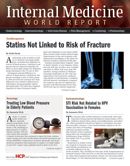Publication
Article
Internal Medicine World Report
Conditional Disease-free Survival after GIST Resection Improves Over Time
Author(s):
A recent JAMA Surgery study by Danielle A. Bischof, MD, of Johns Hopkins University and her American and Canadian colleagues was the first to estimate conditional disease-free survival (CDFS) for primary gastrointestinal stromal tumors (GISTs) following complete surgical resection.

A recent JAMA Surgery study by Danielle A. Bischof, MD, of Johns Hopkins University and her American and Canadian colleagues was the first to estimate conditional disease-free survival (CDFS) for primary gastrointestinal stromal tumors (GISTs) following complete surgical resection.
Complete surgical resection of primary GISTs remains the treatment associated with the best chance of cure. Currently available tools to predict GIST recurrence risk calculate disease-free survival (DFS) using factors such as tumor size, mitotic rate, tumor site, and tumor rupture to create nomograms predicting DFS after resection.
CDFS estimates are thought to be a more meaningful measure of prognosis in patients who have survived for a period post-surgery than DFS, which is calculated from time of surgery.
Bischof and colleagues retrospectively studied 502 patients at 7 major US and Canadian academic cancer centers between January 1, 1998, and December 31, 2012, comparing the performance of established GIST risk stratification and prognostic scoring systems in patients undergoing surgery for a primary, nonmetastatic GIST. These included the National Institutes of Health (NIH) criteria, modified NIH criteria, Memorial Sloan Kettering Cancer Center GIST nomogram, and American Joint Committee on Cancer gastric and nongastric categories.
Overall, 1-year, 3-year, and 5-year DFS after resection of GISTs was 95%, 83%, and 74%, respectively. All the prognostic scoring systems had fair prognostic ability. Using CDFS, the probability of remaining disease free for an additional 3 years given that the patient is disease free at 1 year, 3 years, and 5 years was 82%, 89%, and 92%, respectively.
Patients with the highest initial recurrence risk showed the greatest increase in conditional survival as time elapsed.
The researchers concluded that CDFS improves over time following resection of GISTs. “This is valuable information about long-term prognosis to communicate to patients who are disease free after a period following surgery,” they noted.






